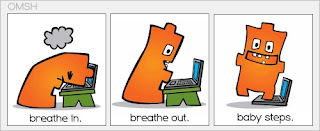
A few days ago a client was telling me how much more she gets done now that she's learned to take a series of small steps to tackle the big, scary projects she used to avoid.
Susan Beth just wrote about this same topic in The Now Habit Yahoo! Group; I'm quoting her (with permission) because her words are so eloquent. She uses a tool called Rainlendar to manage her to-do list, but the approach she mentions can work no matter what tool you use.
So here's Susan Beth writing about "tasks that will take a relatively long time to do, that are basically boring and/or non-urgent. Like purging no longer needed receipts and such from the file cabinet. Or turning an envelope of clipped recipes into an orderly cookbook. Or cleaning out unwanted files/programs from your computer. Or reading that book you know holds useful info but isn't exactly a page-turner.
All things I want to do, mean to do . . . just somehow never get around to doing.
Now I have put all of these types of tasks on the ToDo list in a 'holding' area . . . and label them as 'incremental' tasks. Like so: INC: transfer file archives from floppies to CDs.
Next I picked five of these tasks to start on. For each I decided exactly what would be an acceptable babystep on accomplishing them.
For example, one task was to clean out the tangled mess of my IE 'Favorites'. See, I automatically add every page someone recommends to it, so I can find my way back to it -- and I almost never remember to delete the link later on. So I have HUNDREDS of links, many with cryptic names. The babystep I chose was 'Click on each link. If the link is dead OR no longer of interest, delete it. Otherwise fix the name to clearly convey what it is and move it into an appropriate subfolder. Continue until you have deleted five links.'
Another task was to triage the hall bookcases to open up room for new books, and the ones already waiting in tottering heaps in the corners . . . The babystep is 'Look at the bookshelves long enough to find five books I no longer want, and put them into the Donate box.'
Then I made these five tasks 'active' by setting their due date to the next day AND set them to recur daily. With the reminder to do these tasks in my face each time I sit down at the computer AND with the required work itself so minor (none of them take more than 5-10 minutes) I seem to have no reluctance at all to tackling them. In fact, I get so much pleasure from seeing each task vanish from today's ToDo's as I mark them completed that most days I hurry and knock them all off before I go to work. :)
And, let me tell you, whether you call it 'Babystepping' a la Flylady or 'Starting often' a la Mark Forster, it WORKS. Even if you do the bare minimum, the task seems to melt away painlessly. A lot of the time I set out to do the babystep and find myself carrying on for way past the minimum. Yes, I discover that this 'horrible job' I've been dreading and putting off -- even for years in some cases -- simply isn't all that hard or bad, and isn't as time consuming as I feared.
For example, I've been needing to clear out my 'junk utensil' kitchen drawer forever. Not the true junk drawer with rubber bands and batteries and such -- that's another job waiting in the Incremental area. This is the drawer full of cooking utensils I've acquired, often gifts or impulse buys, but which I either disliked or only very rarely use. The drawer was packed so full I could barely open it, and almost never bothered to because I couldn't find anything in it anyway. So I made cleaning it out one of my incremental tasks, with the baby step being to make decisions on ten items each day -- keep or toss.
Well, for three days I did the babystep, no problem. The fourth day I decided it would be a good idea to dump the entire drawer out into a box so I could wash and reline the drawer, so as to be able to put away the 'keepers.' And once I'd put in the keepers from the first three days, well, I could see a few more things I wanted on the top of the heap in the box, plus all of those things were obviously useless. And once those were out of the box I could see . . . I ended up sorting out everything in the box in less than 20 minutes. Now the drawer holds only a single layer of utensils I actually want to have and use occasionally (such as a melon baller, kebab skewers, egg slicer) and since I can see everything and grab what I need at once, I actually use them. :)
Of course I also feel a little silly. I'd been dreading and avoiding a task that in the end took me just about a half hour in total to do, and which is already paying dividends in making my life just that bit easier. I try to keep that in mind each time I finish one incremental task and replace it with a new one.
No matter how yucky the task seems, it will be finished faster and with less stress than I imagine, and having it done will make me feel a little more confident and in control of my life."
[cartoon by Heather Sanders, Oh My Stinkin' Heck!]

2 comments:
I cannot tell you how many "horrible" tasks I've avoided, only to discover when I finally tackled them that they didn't take as long to finish as I'd expected and they weren't as horrible, either. What strange quirk of the brain makes us avoid and agonize over these kinds of chores rather than act on them?
And if you can answer that question, you've got a zillion-dollar's-worth of insight!
Cynthia, all I can do is answer for myself. The "horrible" tasks I put off often fall in one of these categories:
1. Even if it's a relatively small task, it's something I just don't have the skills to do myself - and somehow I haven't yet realized the answer is to hire someone to help.
2. There's a new and unknown component that makes it feel bigger than it actually is.
3. It's something I'm trying to do with a higher degree of perfection than the situation warrants. Once I ease up, it gets done just fine.
4. I don't have the right tools for the job - once I get them, it becomes much easier.
5. It's something I really don't need to do at all - and should be removed from my to-do list. Maybe it got there because someone else suggested I should do it, but on reflection it's not right for me.
Post a Comment